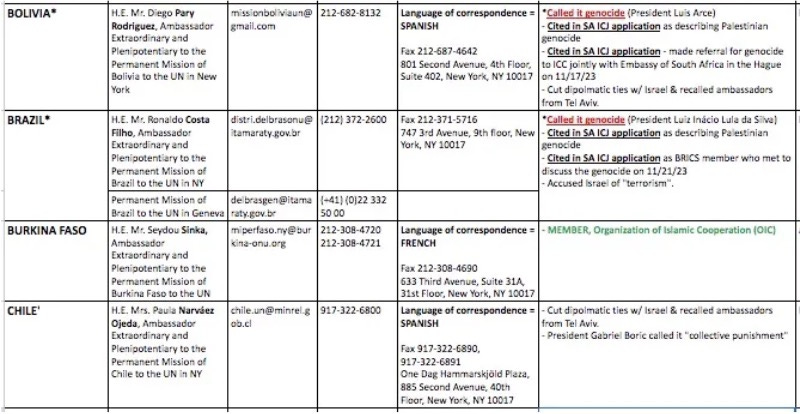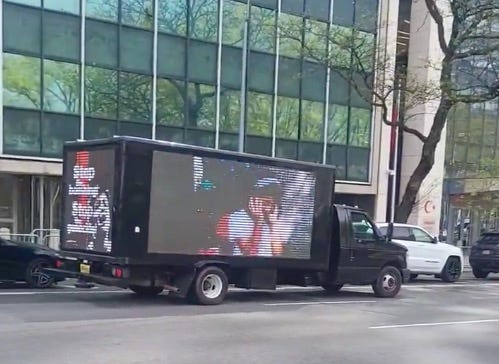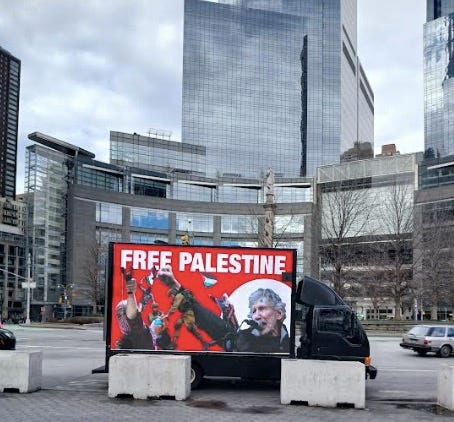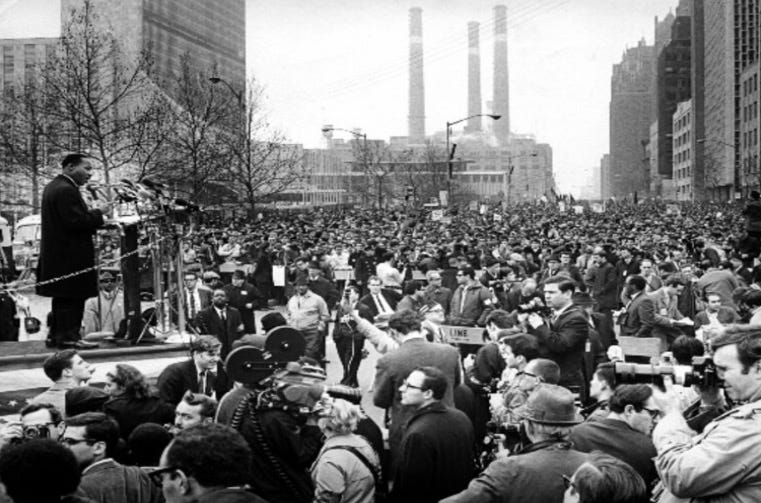"Uniting for Peace" is Next Step in Invoking Genocide Convention Process to Protect Palestine
The UN General Assembly must be pushed to do what it can, including a resolution for sanctions against Israel. Could directing protests at the UN help make that happen?
"I like to believe that people, in the long run, are going to do more to promote peace than our governments. Indeed, I think that people want peace so much that one of these days governments had better get out of the way and let them have it." — Dwight Eisenhower
Following the latest orders from the International Court of Justice that Israel halt its military offensive in Rafah, some claimed that while the orders of the Court are of course binding, there’s “no enforcement mechanism.” The Court’s orders were of course the result of South Africa’s invoking the Genocide Convention against Israel and its repeated requests for additional orders from the ICJ.
In fact, there is such an enforcement mechanism — it’s the UN Security Council. The ICJ is a court that issues orders. The UNSC should act like a sheriff which implements those orders.
The problem of course is that the US government has misused its veto power to prevent the UNSC from actually ensuring security, vetoing numerous resolutions on Palestine since October. And another UNSC draft resolution by Algeria is now in the works and it’s evident that the US government will veto and/or water it down.
But there is a mechanism to address such a situation. It’s called Uniting for Peace, whereby the UN General Assembly asserts itself in a situation threatening the peace when the Security Council won’t or can’t. Uniting for Peace (UNGA Resolution 377, from 1950, PDF) states:
"Resolves that if the Security Council, because of lack of unanimity of the permanent members, fails to exercise its primary responsibility for the maintenance of international peace and security in any case where there appears to be a threat to the peace, breach of the peace, or act of aggression, the General Assembly shall consider the matter immediately with a view to making appropriate recommendations to Members for collective measures, including in the case of a breach of the peace or act of aggression the use of armed force when necessary, to maintain or restore international peace and security. If not in session at the time, the General Assembly may meet in emergency special session within twenty-four hours of the request therefor. Such emergency special session shall be called if requested by the Security Council on the vote of any seven members, or by a majority of the Members of the United Nations".
The UNGA actually held a vote for a ceasefire in Gaza (153 countries voting yes) last year using United for Peace but it didn’t invoke meaningful collective measures.
Uniting for Peace has been used numerous times, perhaps most successfully in the 1956 war, which actually involved Gaza. In choreographed manner, Israel and then Britain and France invaded Egypt after Gamal Nasser nationalized the Suez Canal. The French and British vetoes at the Security Council of course prevented it from taking appropriate action. Most of the rest of the world — including the US and USSR together — moved to use Uniting for Peace.
This was the first time UN peacekeepers were used. The United Nations Emergency Force was created to ensure the withdrawal of the invading armies.
President Eisenhower would later report to Congress: “In Egypt the United Nations caused the world to turn away from war. Through a series of resolutions, the General Assembly effectively mobilized world opinion to achieve a cease-fire, and France and the United Kingdom shortly agreed to withdraw their forces. The Assembly's moral pressure played a powerful part in securing the withdrawal of Israeli forces from Egyptian territory in March of this year.”
The US State Department later noted that “Israel kept its troops in Gaza until March 19, 1957, when the United States finally compelled the Israeli Government to withdraw its troops.”
Demands
Legal experts note that similar measures could be taken now.
In fact, Francis Boyle, who represented Bosnia in its Genocide Convention case before the ICJ and who was the leading proponent for a country invoking the Genocide Convention against Israel, always argued that invoking the Convention should be followed by the GA using Uniting for Peace “for enforcement against Israel.” See piece from 2014, during Israel’s attack then which killed over 1,000 Palestinians. Boyle in the news release “New World Court Order Against Israel: Could Uniting for Peace Stop Israel’s Assault?” outlines a number of steps that can be taken and other legal scholars agree, also see a recent interview below (he also recently appeared with me on a recent CodePink talk):
Similarly, professor emeritus of international law at Ohio State University, John Quigley, whose books include The Statehood of Palestine: International Law in the Middle East Conflict (Cambridge University Press) and The Ruses for War: American Interventionism Since World War II, said last December: “The U.S. government is continuing to veto and delay at the UN Security Council as Israel violates international law with its bombing in Gaza and other actions. There’s a whole host of things that should be happening under international law that are not being done. This is partly a result of U.S. government obstruction, but there are other factors as well. …
“The General Assembly can use Uniting for Peace to get around the U.S. veto. This is how the U.S. was able to fight the Korean War under the UN flag. The General Assembly can call on member states to impose a trade embargo on Israel, it can even call on member states to organize a military force. It could suspend Israel.”
On March 25, with only five days left in the Muslim holy month of Ramadan, the UNSC finally passed a resolution calling for a ceasefire during Ramadan. But even that meager measure was immediately undermined with the US government claiming the resolution was “non-binding.”
UN whistleblower Craig Mokhiber, who headed the New York office of the United Nations High Commissioner for Human Rights, said then: “You could have seen a resolution with teeth, with substance, resolution that included diplomatic, military, political, economic sanctions — not the enforcement of those sanctions, but the call for those sanctions — the deployment of a protection force, the establishment of a tribunal, the establishment of permanent mechanisms, as was the case within the United Nations during apartheid in South Africa. So, there are actions that could be taken here, but the nonveto has slowed action in the General Assembly, while at the same time allowing the United States to claim that, yes, the resolution passed, but somehow it’s not binding.”
Boyle notes that part of the utility of Uniting for Peace is that it has already been invoked in the case of Palestine and can be reconvened at any time; there’s no need to wait for another US government veto.
Demanding Demands
While US government machinations have done a great deal to enable Israel’s carnage, other states who say they are opposed to it have not done what they can.
Global citizens last year successfully urged South Africa to invoke the Genocide Convention against Israel and the South African government stepped up. Then they urged other states to join, which Nicaragua, Columbia, Libya and most recently Mexico have done, with others saying they will.
Now, global citizens can use some of the same resources, like this spreadsheet put together by a volunteer:
They can urge countries to fully utilize Uniting for Peace as outlined by Prof. Boyle:
“Suspend Israel from participation in its activities as the General Assembly did to the former criminal apartheid regime in South Africa and to the genocidal Yugoslavia;
“Set up an International Criminal Tribunal for Israel in order to prosecute its highest level civilian and military officials for war crimes, crimes against humanity, and genocide;
“Recommend economic sanctions against Israel;
“Recommend UN members sever diplomatic relations with Israel;
“Admit Palestine as a full fledged UN member state.”
New York State of Mind: From Columbia to Colombia
Activism might take an especially poignant form at UN headquarters in New York City, as well as government buildings around the world. In NYC there have of course been vibrant protests at Columbia University and elsewhere, often attacked by police.
The activist Randy Credico has been driving a truck around NYC, and especially around the UN, showing the gruesome reality of Israel’s carnage.
An immediate task for activists — student and otherwise — in NYC may be to direct efforts at the UN. Protesters who have been targeted and imprisoned will be in an especially strong place to urge representatives from various countries at their UN missions to go beyond the solemn speeches which we have seen many of since October about the horrors being rained down upon Palestinians. What’s needed is maximal action.
The Zinn Education Project reminds us: “On April 15, 1967, amidst growing opposition to the U.S. war in Vietnam, large-scale anti-war protests were held in New York, San Francisco, and many other cities.
“In New York, the protest began in Central Park, where more than 150 draft cards were burned, and concluded at the United Nations with speeches by Reverend Martin Luther King Jr. and others.” See more photos and video of MLK at the UN protest.
Getting Beyond UN Speeches
Many global political figures have made speeches at the UN and elsewhere denouncing the Israeli and US governments. And that’s good. But not good enough.
Brazil’s President Luiz Inácio Lula da Silva has scored headline after headline saying that Israel is committing genocide — strangely getting more and better attention than Nicaragua’s remarkable legal action against Germany for enabling Israel’s genocide. And Brazil did finally just recall its ambassador to Israel, but that’s no substitute to movement toward sanctions and other measures which can be furthered by using Uniting for Peace. Nor is Ireland, Norway and Spain finally recognizing Palestine, which most of the world did decades ago.
As of last year, the leaders of Colombia, Türkiye, Bolivia, Venezuela, Jordan, Pakistan, Algeria, Iran, Qatar, Oman and of course the Palestinians themselves all called Israel’s slaughter a “genocide” — yet none invoke the Genocide Convention until South Africa did so on Dec. 29. Now, they are failing to rally and push for maximal action using Uniting for Peace at the UN General Assembly.
Many other countries including Chile, Indonesia, Bangladesh, Comoros, Belize, Chad, Honduras, Bahrain, Cuba, Belgium and Spainhave charged Israel with serious crimes. Ireland recently announced it would back South Africa’s genocide case, so presumably the Irish government now believes Israel is committing genocide.
Türkiye President Recep Tayyip Erdoğan said back in December: “With the torment in Gaza, we believe that this helpless and dysfunctional structure of the United Nations will be questioned all over the world. Look, I am saying very openly: Nothing can continue as business as usual after Gaza.” Erdoğan and others need to be made to live up to those words.
The US government will loudly proclaim that a General Assembly resolution is not binding. But standing against a unified vote of the world will further isolate the US establishment. And in any case, the US government has claimed that UN Security Council resolutions are not binding when it was convenient for it to do so.
The US and Israeli governments will only be stopped by concerted action coming from different directions. Strong action using Uniting for Peace will empower Boycott, Divestment, Sanctions and other movements.
It may also be a major step in developing a better world system.
Malaysia has put forward proposals to break the grip of a single member of the UNSC’ veto: “The exercise of the veto by the members of the security council should be regulated to prohibit it from being used unjustifiably or abused by permanent members against the wishes of the majority of member states.”
What better step than the General Assembly coming together forcefully for peace to make that happen?
It’s past time that the various missions to the UN and the associated governments proclaiming their desire for peace get well beyond comfortable posturing and engage in serious movement.






No comments:
Post a Comment